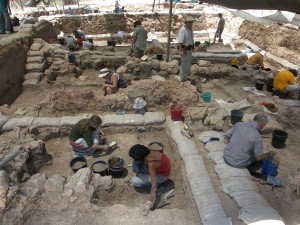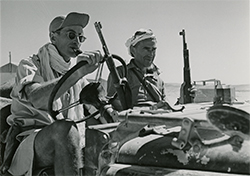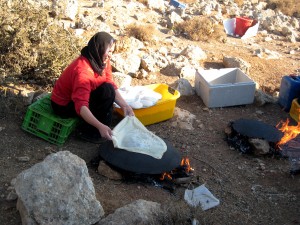ASOR’s membership spans across many fields of study. We’re fortunate to have historians, geologists, archaeologists, and so many more among our ranks. Every year, we come together to discuss discoveries in the field and our research at the ASOR Annual Meeting.
The Annual Meeting is not only a place to present scholarly work, but also a place for networking and catching up with old friends - or making new ones. It’s a place where student members and other junior scholars can present papers and posters, all while receiving feedback from seasoned professionals. This got us thinking about what words of wisdom some of our more experienced members would have for our newer members.
We sat down with a few of our members at the most recent Annual Meeting for a new segment on ASORtv, ASOR Interviews. We asked the question, “What advice do you do you have for those just starting out?” expecting it to be a great resource for newer ASOR members. However, after working on the video and listening to all the advice, we realized their answers were relevant to anyone starting something new - not just beginner archaeologists. Take a look.
We encourage you to watch the video above to see who we interviewed and their full quotes. Though, if you find yourself in a quiet zone with no headphones, check out the top 10 list below.
10 Career Tips From ASOR Members
1. GET FIELD EXPERIENCE
People often say there are two sides of archaeology. There’s the field, and there’s the office side (i.e. processing data collected in the field, publishing articles, applying for grants). It’s important that you don’t just study archaeology in the classroom, but that you actually get out there and experience it in the field. And you know, ASOR offers fellowships and scholarships to support those who wish to go on an excavation. This will help with tip number 2.
2. BE SURE THIS IS WHAT YOU WANT TO DO
All too often, people pursue a major or field and realize that it’s not what they want to do. The best way to avoid this is to know what you’re getting yourself into. You can do this several ways. Getting some field experience is one way. That will at least help you know what being in the field is like. Find your local (town, city, or state) archaeology resource and see if they’re taking any volunteers. The Boston Archaeology website has a whole page dedicated to their volunteer projects. Research the position you think you may want. Know the expected salary and typical degree level for the position you ultimately want to hold.
3. WORK HARD
This seems like a given, but sometimes it has to be said. Repeatedly. Work hard. It’s like that Hunter S. Thompson quote, “Anything worth doing, is worth doing right.” If this is something you want to spend your life doing, then you have to work hard at it. This field isn’t one in which you can just skate by and expect to be the next Nelson Glueck (who, in case you didn’t know, is pretty much our real life Indiana Jones - archaeologist, academic, spy).
4. GET YOUR RESEARCH OUT THERE
Make a name for yourself. Publish papers. Present at conferences (like the ASOR Annual Meeting - now accepting papers/posters). Ask a seasoned professional in your field to review your writing for you. These are all things that can help you when you graduate, or as you climb that next rung in your career. We also offer scholarships to help students attend the Annual Meeting.
5. NETWORK
Network. Network. NETWORK. It’s not always the top thing on our minds, but meet everyone. Get to know everyone. Be nice to everyone. You never know who is going to be the person that could help you out. You don’t want to submit your research or applications and realize that person you were rude to now gets to make a decision about your life.
6. FIND A MENTOR
Find someone with experience who can help guide you through these stages in your career. The sooner you connect with someone the better. There are people who don’t have the opportunity to meet someone who could be a mentor. As a member of ASOR, you’re a part of a large organization with people who have been where you are. Reach out and establish a relationship with someone who is doing (or has done) what you would like to do.
7. MAKE CLEAR DECISIONS ABOUT YOUR LIFE
Probably the most sobering advice given in the video. This is referencing clear decisions about how your prioritize elements of the personal and professional spheres of your life. “One, by definition, has to make sacrifices,” said Johnathan Rosenbaum, President Emeritus and Professor Emeritus of Jewish Studies at Gratz College. He says it’s a tricky road to walk, but if you have a clear plan from the beginning then you can do great things.
8. APPLY FOR GRANTS
Don’t get discouraged if you have to apply for two, or three, or ten, or fifty grants (remember tip 3). If you keep applying, you’re bound to get something. Don’t forget, if you need help getting to an excavation, ASOR can help.
9. BE OPEN TO NEW THINGS
You’re going to experience lots of interesting and sometimes uncomfortable things. (Ever been on a dig in the Near East in the middle of summer? Don’t forget your sunscreen!) Sometimes stepping outside of your comfort zone will show you exactly what your niche will be. Be open to, and 100% present in, new experiences.
10. ENJOY
Savor every moment of this experience. It’s a once-in-a-lifetime chance to go out there and learn everything you can. Now is when you get to start your career, and you don’t want to look back and think of all the should haves and what ifs. When you’ve been doing this for 50 years, you’ll want to look back and say you’ve experienced everything you could, and wouldn’t change a thing.
Over the course of the next few months, we’ll post interviews from the Annual Meeting, as well as conduct more interviews throughout the year. We hope to tell a narrative of our members and the vast collective knowledge they hold, not only about their fields, but also of ASOR.
If you liked this article and want more like it, let us know! Be sure to share this post on Facebook, and tweet it out on Twitter! As always, we’d love to hear from you! If you have advice for people just starting out in their careers, comment below. We’ll share the top comments on Facebook and Twitter. So be sure to like us on Facebook, follow us on Twitter, and subscribe to us on YouTube.
~~~
All content provided on this blog is for informational purposes only. The American Schools of Oriental Research (ASOR) makes no representations as to the accuracy or completeness of any information on this blog or found by following any link on this blog. ASOR will not be liable for any errors or omissions in this information. ASOR will not be liable for any losses, injuries, or damages from the display or use of this information. The opinions expressed by Bloggers and those providing comments are theirs alone, and do not reflect the opinions of ASOR or any employee thereof.


